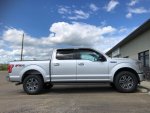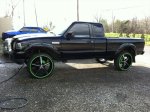Interesting thread. I'm on the opposite side of the Toyota vs Ford debate. Everyone I know with a Ford truck except one guy has issues. Mostly minor, but multiple people I know are dealing with the 10speed acting weird, hesitant, or hard-shifting, and a couple of them have had the dreaded cam phaser issue. One guy's 10-speed was fine until he had to have his cam phasers replaced, and it hasn't shifted right since, even though he has put 3k miles on it since sending it back to be reprogrammed. You might say, "yeah well that's all anecdotal!" True. BUT, the only actual long-term reliability study in existence (Dashboard Light) does not have great data for Ford. 18% of F-series trucks experience drivetrain issues within the first buyer's ownership. That's drivetrain issues only! That's like 1 in 5! Unreal. Ford has a long history of releasing unproven tech too quickly to stay at the front of the pack and using deeply discounted fleet sales to claim "best selling truck" while losing the highest percentage of class action lawsuits.
After driving almost only domestics for most of my adult life , I got into Toyota in 2017 when I bought my first, a 2012 4Runner. Yeah, it's not fast or exciting. But getting under the hood and under the truck, it is made like a tank and designed with ease of self-maintenance in mind. I ABUSED that thing and traded it in with 135k on a '21 Tundra, my first brand new vehicle. I did it because my family outgrew the 4runner, and I was (and still am) really impressed by the 2nd gen Tundra's reputation for going extremely long miles even when abused beyond Toyota's stated limits. There are Tundras that weigh 2k lbs over GVWR dry with no one in them, and they just keep trucking along. They are wildly underrated. I've put 24k miles on mine in the first year. I love it. It has a very short nose and the smallest turning radius of any fullsize truck. It is fantastic off road. I have a bit of bed bounce on the highway (downside of a 14-year-old design), but it's not bothersome. And I do get 14mpg combined on 35s, and yes that's lower than an F150. But I plan on owning this truck a very long time and never seeing my dealer a second time. I also plan on continuing to go out to remote places and coming back without issue every single time. Not saying people don't do that in a Ford, but fewer of them as a % do.
For those of y'all thinking that Toyota copied Ford with the 3rd gen hybrid Tundra...did you know that they decided to work together on a hybrid truck 11 years ago? Right after Toyota showed them their plans for a hybrid drive pickup, Ford abruptly walked away from the table with Toyota's plans in hand.
Anyway, the future remains to be seen. I am frustrated with Toyota and thankful I got in on the last year of the 2nd gen Tundra. The 3rd gen Tundra has had some alarming issues so far in its rollout. It is a wildly more complicated truck, and yet we still see the same old Toyota that doesn't care to play ball with competitors feature for feature. I could buy an F150 right now with over a ton of payload. (I wouldn't but I could). Toyota, on the other hand, is actually underrating their trucks' payload ratings. 3rd gen owners have gone to CAT scales and found that there is more room between curb and GVWR than Toyota prints on the door jamb. What in the world? They had 14 years to fix the two biggest complaints (fuel economy and payload), and the returns on each are underwhelming and at the expense of it being a far more complicated truck.
My Tundra will last so long, who knows what the landscape will look like when it's time to trade it in. If Ford develops a track record for long-term reliability and somehow keeps offering more features (like the 7.2kW generator), I'll leave Toyota in a heartbeat.



